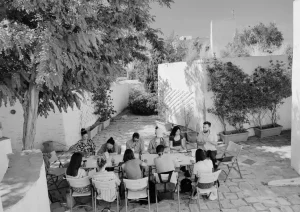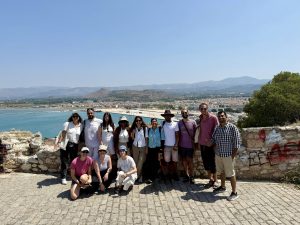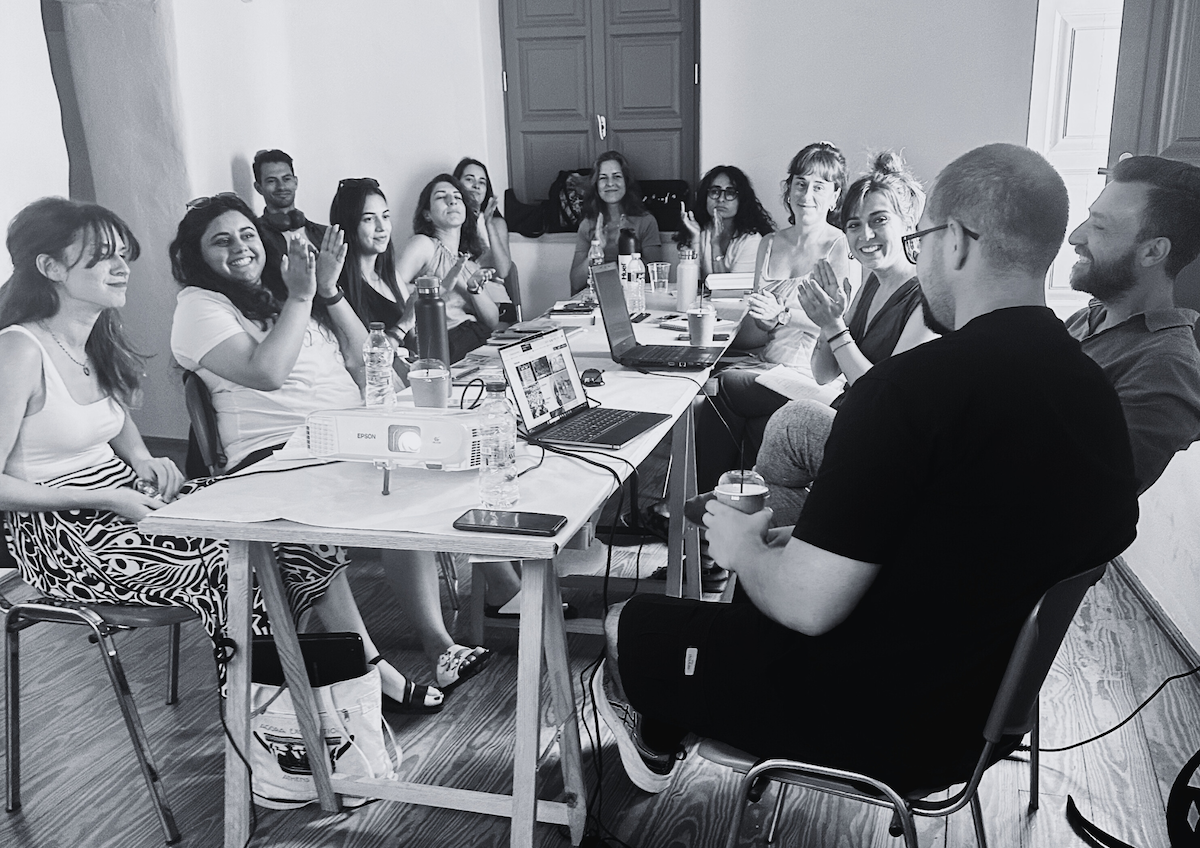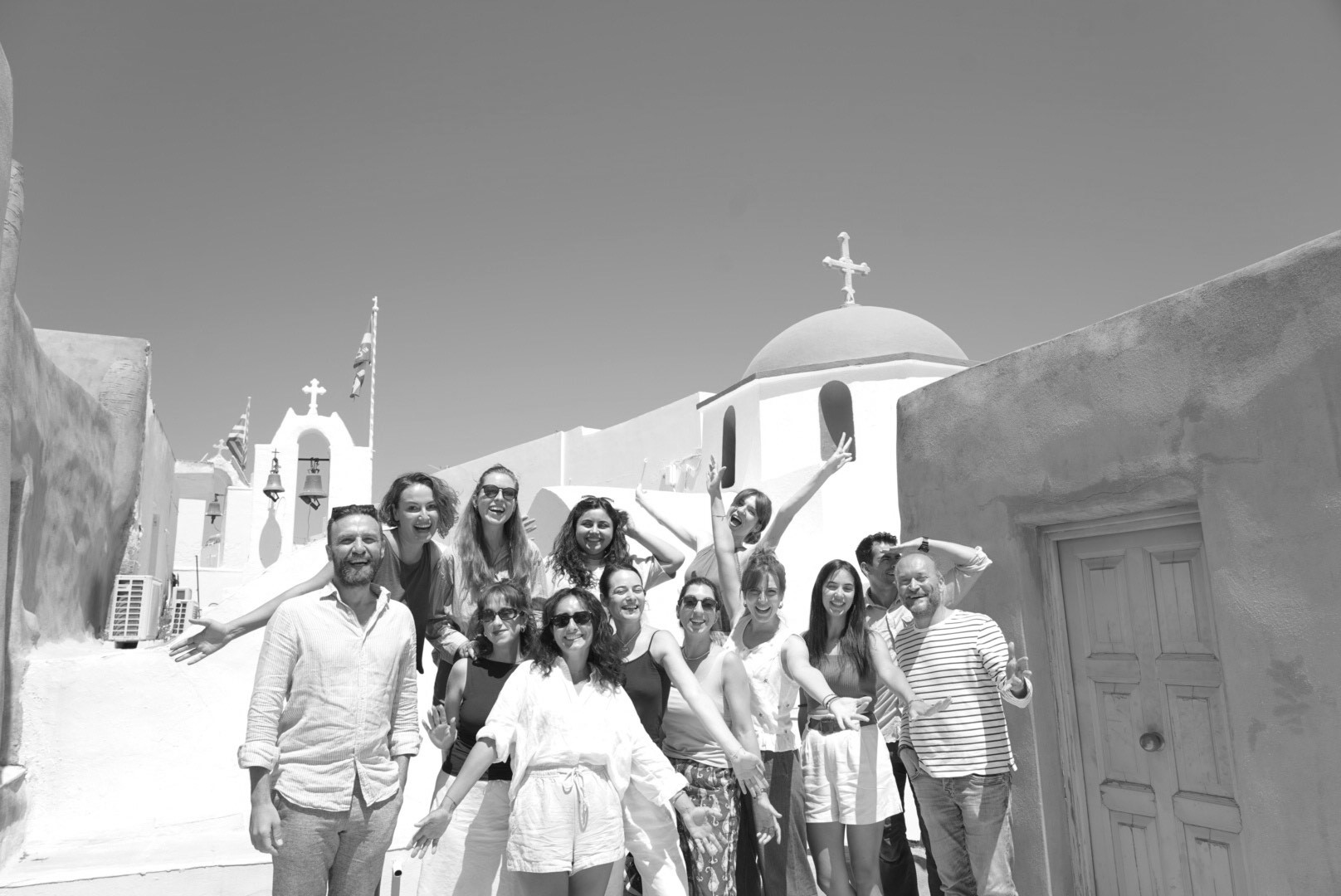: Summer School
Applications Now Open for the 2026 Cultural Heritage Summer Schools
We are delighted to announce that applications are now open for our 2026 Summer Field Schools in Greece. This year’s programmes bring together community focused heritage practice, advanced digital documentation, and hands-on field experience. Both summer schools offer updated structures for 2026, including more flexible online learning, expanded field components, and a strong emphasis on collaboration, critical thinking, and practical application.
Engaging Communities in Cultural Heritage
Dates: 08 to 28 June 2026
Hybrid Programme: Online and Paros, Greece
Application Deadline: 1 March 2026
Deadline for Greek Living Heritage Network applicants: TBC
This programme explores how cultural heritage professionals can work with communities in meaningful, responsible, and sustainable ways. The online opening week introduces key concepts, participatory methods, community empowerment, and ethical engagement. The two-week in-person phase on Paros brings these ideas to life through field visits, workshops, and collaboration with local stakeholders. Participants gain valuable skills in communication, facilitation, co-creation, and community driven heritage interpretation, making this course ideal for practitioners, students, and researchers seeking a grounded approach to engagement.
Programme Structure
8 to 14 June: Online training programme
15 to 28 June: Field School in Paros, Greece
Read more and apply here.
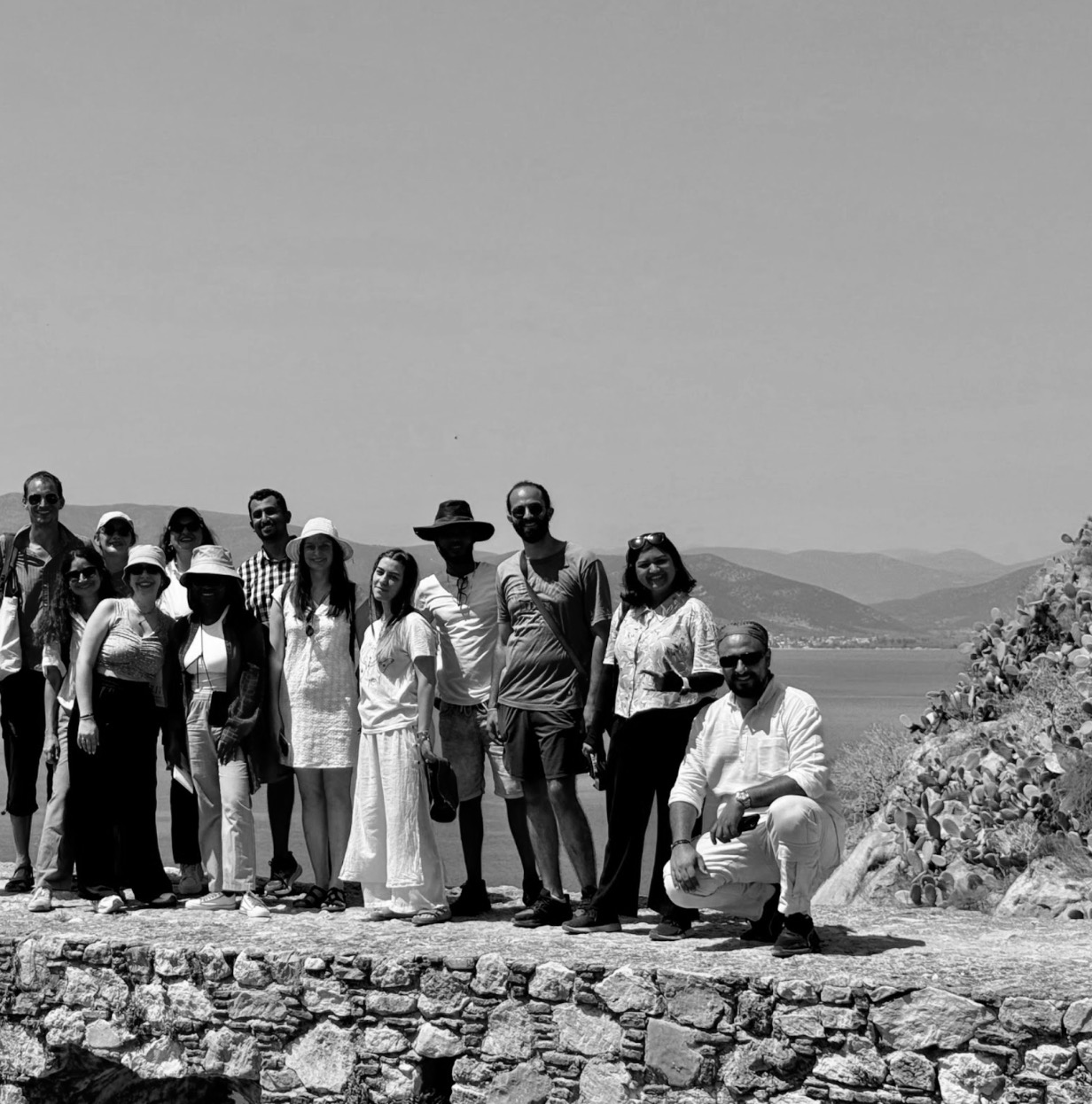 Digital Tools for Cultural Heritage Management
Digital Tools for Cultural Heritage Management
Dates: 24 April to 18 June 2026
Hybrid Programme: Online and Nafplio and Tolo, Greece
Application Deadline: 13 April 2026
The 2026 edition introduces a redesigned and extended online training format based on participant feedback and evolving professional needs. The new structure provides more time between online sessions to process material and practise techniques, more time between the online period and the field school to support preparation, no conventional lectures with trainers instead acting as supervisors and consultants, and a more on-demand and flexible learning model rather than a strict schedule.
Programme Structure
24 April to 2 June: Online training programme
24 April to 15 May: Cartography using GIS (Online)
19 to 29 May: Photogrammetry and Image Based 3D Modelling (Online)
7 to 18 June: Field School in Nafplio and Tolo (In person), featuring photogrammetry, image based 3D modelling, and terrestrial laser scanning
This hybrid model allows participants to build skills steadily online before applying them intensively in the field school.
Read more and apply here.
Digital Tools Summer School Programme
From 12th May to 18th June, HERITΛGE hosted its Digital Tools Summer School programme, bringing together 24 participants from Africa, Asia, and Europe.* The programme combined online and in-person training and equipped heritage professionals with practical skills in GIS, photogrammetry, 3D modelling, and terrestrial laser scanning.
From 12 May – 6 June the trainees took part in an online Training Program, while from 8 – 18 June those attending the Field School on the ground worked with trainer Cornelis Stahl in and around teh two of Nafplio, in the historic region of Argolida in Greece.
The Summer School engaged with 21 capacity building cases from across the globe, involving museums, universities, heritage organisations, and architectural firms. Institutions included the Khama III Memorial Museum in Botswana, the Uganda National Museum, the National Museums and Monuments of Zimbabwe, and the Ethiopian Heritage Authority, as well as international organisations such as UNESCO and the World Monuments Fund. Universities including Addis Ababa University, the University of Cologne, and the University of Lincoln also contributed to the knowledge exchange. These cases reflected a wide spectrum of heritage practice, from community-based hubs to global conservation bodies.
Geographic Information Systems (GIS)
The first module introduced Geographic Information Systems (GIS). Over two weeks, participants explored the use of open-source software QGIS to manage and analyse cultural heritage data. They learned how to source and style datasets, georeference manuscript maps, create new spatial data, and apply geoprocessing tools such as buffers and intersections. By the end of the module, each participant had produced a map tailored to their own heritage project, demonstrating their ability to use GIS to present and analyse spatial data.
Photogrammetry and 3D Modelling
The second module focused on photogrammetry. In a week and a half, participants developed skills in image-based 3D reconstruction, creating orthophotos and point clouds using Agisoft Metashape Professional. Combining photography, computer vision, and GIS, they produced 3D models that will aid in heritage documentation, monitoring, and communication. This workflow allowed participants to cover the full cycle from image acquisition through data processing to model publishing.
On-site 3D Documentation
For those attending in person in Greece, the Summer School expanded into hands-on training with UAVs and terrestrial laser scanning. Participants learned to operate drones for site documentation in line with European regulations and were introduced to different scanning technologies for generating detailed point clouds. Using open-source software such as CloudCompare, they processed their data to create high-quality deliverables, including interactive 3D models and visualisations.
The group also visited six cultural locations in the Peloponnese, where they applied their skills in real-world conditions. These included Moni Metamorfosi and Mycenaean Graves at Asini, Ottoman fountains in Nafplio Old Town, the Old Windmill at Drepano, and the churches of Saint Konstantinos and Profit Elias. Fieldwork at these sites allowed participants to test both photogrammetry and laser scanning methods, and to see how these tools can support heritage documentation, preservation, and public engagement.
By the close of the Summer School, participants had developed a strong foundation in GIS, photogrammetry, and 3D documentation techniques. They left with practical tools to apply in their own contexts, from community-led heritage initiatives to national museums and academic institutions. Just as importantly, they joined a global network of peers committed to safeguarding cultural heritage across continents.
Read more about HERITΛGE’s summer schools here.
*Botswana, Egypt, Ethiopia, Greece, India, Kenya, Italy, Lebanon, Palestine, Romania, South Africa, Tanzania, Turkey, Uganda, Yemen, and Zimbabwe.
Summer Field School in Community Engagement for Cultural Heritage
This summer, HERITΛGE’s 11th Engaging Communities in Cultural Heritage Summer School brought together students, researchers and practitioners from around the world for two weeks of learning, discovery and collaboration. Through a range of activities, participants explored how communities engage with cultural heritage through a mix of academic sessions, practical fieldwork and creative activities.
The first week of the programme involved online teaching where participants were introduced to the ideas of engaging communities. Then, from June 23rd to July 6th, participants travelled to the Island of Paros where they were able to further explore what they had learned. Here is a look back at how it went.
Day 1: Mapping First Impressions
The in-person programme began in Paroikia, the island’s capital. After an introductory session, participants stepped out to create personal maps of the area using their senses as guides. In a group discussion, they shared first impressions and identified key questions to explore in the days ahead.
In the evening, the group travelled to Aliki to join the Klidonas midsummer festival. Music, dancing and lively conversation provided a first opportunity to connect with the local community and one another.
Day 2: Sensing the Island
Participants deepened their exploration by tuning into the sensory dimensions of Paroikia, focusing on its sounds, smells, textures and colours. Later, they collaborated on a collective mental map that reflected both individual and shared perspectives.
The day ended with a welcome dinner by the coast, accompanied by traditional music and conversation.
Day 3: Observation and Oral History Skills
Having become more familiar with the environment, participants focused on specific locations of interest, blending observation with active participation.
A hands on session introduced tools and techniques for conducting oral history interviews, with a focus on audio and video recording.
Day 4: Learning from the Locals
The group met with Spyros Mitrogiannis, a leading figure in local cultural work, who guided a visit to the Institute for Archaeology of Paros and the Cyclades. He shared insights into the cultural, environmental and political landscape of the island.
In the afternoon, participants examined themes such as ancient quarrying, fishing traditions and contemporary religious practices, laying the groundwork for their field research.
Day 5: Stories from Afar and At Home
Two guest speakers enriched the day’s programme. In the morning, Traci Kawai presented the Fisher Child project from Cape Town, a VR and AR exploration of sea, memory and healing.
In the evening, Katerina Konstantinou shared her research on folklore and local material culture, examining how heirlooms and souvenirs shape participatory documentation.
Between sessions, teams continued developing interview guides in preparation for community engagement.
Day 7: Walking the Paths of Heritage
In northern Paros, participants met Malatestas, President of Paros Park, who spoke about the challenges of heritage management and local involvement. A walk through the park’s trails highlighted the close ties between landscape and culture.
The day concluded with a beautiful sunset watched from the beach.
Day 8: Festivals and Tourism
The day focused on festivals as expressions of identity. Vicky Papadimitriou shared her experience with local, regional and national events, while Tim Healing offered case studies on community tourism and sustainability, prompting thoughtful discussion on responsible development.
Participants also used the day to refine their ongoing projects.
Day 9: Stories Set in Stone
The morning opened with discussions about interviews already carried out, ranging from fishing traditions to quarrying and religious offerings.
In the evening, Spyros Mitrogiannis led a visit to the Ancient Marble Quarries at Marathi, offering historical context and highlighting present day challenges around preservation.
Day 10: Visual Identity and Storytelling
Participants continued reviewing interview materials and shaping their group projects. In the afternoon, Irene Biza led a session on design and identity, exploring how visuals influence perceptions of place.
The day concluded with a screening of Yorgos of Kedros, a documentary that sparked reflection on storytelling and self representation.
Days 11 and 12: Final Preparations and Reflections
As the public presentations approached, teams worked to analyse ethnographic data and create podcasts, videos and visual materials.
Participants also attended a lecture by visual artist Natassa Biza, who offered new insights into ancient spolia around Paroikia, challenging conventional perceptions of historical remnants.
The final day was dedicated to collaboration, as teams prepared their presentations to the local communities and reflected on their shared journey.
Online Conference and Presentation
The field school concluded with the Online Engaging Communities Conference on Sunday, July 6th, where participants shared their insights and creative outputs with an international audience. This event was exclusively available to our trainees and alumni and included presentations and insights from the Summer Field School Alumni who shared their current research projects, sparking an engaging session enriched with thoughtful discussions and commentary.
Following the conclusion of the Conference, the trainees organized a presentation of their work that was open to the public and was widely attended. The presentation took place in the Dimitrokopoulos Building in Paroikia, with the kind support of the Municipality of Paros. During this second part of the evening, participants had the opportunity to share insights from our two weeks of fieldwork with attendees interested in their work.
“After days filled with collective challenges and individual discoveries, often marked by the initial confusion that is so characteristic of ethnographic research, this final presentation felt like both a validation of our efforts and an affirmation of our growing professional identities,” reflects trainee Claudia Valisano. “Beyond that, the event also had the potential to spark fresh interest among local residents in the island they call home, renewing awareness both for them and for us. Once all speeches were delivered and questions from the audience were addressed, guests were invited to enjoy food and drinks on the building’s beautiful terrace.”
You can find out more about our Summer School programmes and future dates here.
Ενεργοποίηση Κοινοτήτων: Υποτροφίες για το Θερινό Σχολείο στην Πάρο
Ανακοίνωση Υποτροφιών για το Θερινό Σχολείο «Ενεργοποίηση Κοινοτήτων στην Πολιτιστική Κληρονομιά» στην Πάρο
Ο οργανισμός HERITΛGE (Πρωτοβουλία για την Ανάδειξη της Πολιτιστικής Κληρονομιάς), στα πλαίσια της συμμετοχής του στο Δίκτυο Ζώσας Πολιτιστικής Κληρονομιάς, ανακοινώνει την προκήρυξη δυο υποτροφίων για τη συμμετοχή στο Θερινό Σχολείο “Ενεργοποίηση Κοινοτήτων για την Πολιτιστική Κληρονομιά”.
Οι υποτροφίες απευθύνονται σε επαγγελματίες ή ενεργούς πολίτες που δραστηριοποιούνται στη διαχείριση και ανάδειξη της πολιτιστικής και καλύπτουν τα δίδακτρα του θερινού σχολείου. Η διαμονή και η σίτιση των συμμετεχόντων δεν καλύπτεται. Οι εκπαιδευτικές δραστηριότητες του θερινού σχολείου πραγματοποιούνται στα Αγγλικά.
Η μία εκ των υποτροφιών, η οποία προκηρύσσεται σε συνεργασία με τον Δήμο Πάρου, απευθύνεται σε επαγγελματίες ή ενεργούς πολίτες που δραστηριοποιούνται στη διαχείριση και ανάδειξη της πολιτιστικής κληρονομιάς και κατοικούν ή έχουν ισχυρούς δεσμούς με το νησί της Πάρου.
Ημερομηνίες Σχολείου:
• 15–22 Ιουνίου: Διαδικτυακή εκπαίδευση
• 23 Ιουνίου – 6 Ιουλίου: Διά ζώσης εκπαίδευση στην Πάρο
Το πρόγραμμα πραγματοποιείται με την υποστήριξη του Δήμου Πάρου, ο οποίος προσφέρει τη χρήση της αίθουσας Δημητρακόπουλου στην Παροικιά και της Δημοτικής Βιβλιοθήκης.
Κατά τη διάρκεια του θερινού σχολείου, οι συμμετέχοντες θα εκπαιδευτούν σε θεωρητικό και πρακτικό επίπεδο μέσα από διαδικτυακά σεμινάρια και επιτόπια συμμετοχική έρευνα στο πεδίο. Θα εξετάσουν καλές πρακτικές στην ανάδειξη της πολιτιστικής κληρονομιάς και θα ανταλλάξουν εμπειρίες με ειδικούς από όλο τον κόσμο.
Καταληκτική ημερομηνία υποβολής αιτήσεων:
Κυριακή 15 Ιουνίου 2025, ώρα 12:00 μ.μ.
Για να υποβάλετε αίτηση ή να ενημερωθείτε, επισκεφθείτε το https://heritagemanagement.org/training/summer-schools/engagingcommunities/
New dates for HERITΛGE summer field schools 2025
HERITΛGE is pleased to announce new dates for our 2025 summer schools. The HERITΛGE summer schools are excellent opportunities for heritage professionals and students to develop existing knowledge and learn new skills for managing heritage. Applicants do not have to have previous experience in the particular field of study and we welcome students eager to improve their understanding in new areas of heritage. Places are limited so we recommend applying soon!
HERITΛGE is offering two programmes for 2025:
Engaging Communities in Cultural Heritage
Date: 16 June – 6 July 2025
Location: Paros, Greece (in person and online)
Language: English
Lecturers: Dr Aris Anagnostopoulos and Dr Lena Stefanou alongside guest lecturers, Dr
Evangelos Kyriakidis and Vicky Papadimitriou
This hybrid programme aims to develop a different approach to community engagement that is based on social and artistic research with community-led initiatives. Through meetings, assignments and fieldwork, students will be introduced to the principles of community engagement and learn how these can be applied in different circumstances, appropriately addressing cultural differences within the field. The duration of the course is two weeks, with five three-hour meetings. Fieldwork will take place on the island of Paros, in Greece.
I applied to this workshop to improve my fieldwork methodology, and I found it greatly helped
me develop because I was able to learn about those details that we cannot learn without
going into the field and starting to work. It has really helpful for me on how to conduct my
research questions and how to engage with the people I am interviewing. (Elif Aydin, a PhD
Candidate at Istanbul Technical University. Engaging Communities in Cultural Heritage,
2024)
Click here for more information and how to apply.
Digital Tools for Cultural Heritage Management
Date: 13 May-17 June 2024 (applications now open)
Location: Nafplio, Greece (in person and online)
Language: English
Lecturer: Dr Cornelis Stal
HERITΛGE have collaborated with HOGENT University (Belgium) to deliver three integrated and consecutive specialist courses in geomatic topic. These courses will cover GIS, Photogrammetry and image-based 3D modelling, and Terrestrial laser scanning*. Students will be provided with hands-on instruction, hands-on demos and exercises in each. Skills taught will help heritage professionals in restoration, documentation, or visualization projects specifically but can be applied to a range of other fields.
*Please note that these specialist courses can be booked individually. For those intending to just do sections of the field summer school, please contact at the email [email protected] for further information and arrangements.
I decided to take the course because I think it could be very useful in my work both for documenting for the future, using it for planning in daily work with managing heritage buildings. Also to make available on the internet for people who are not able to visit in person.(Helen Myhr Radell, Project Leader, Stiftelsen Skansen. Digital Tools for Cultural Heritage Management, 2024)
It was amazing, moving from place to place from old archaeological sites to old church photogrammetry and dealing with all this senior equipment like drones, laser scanning. Processing all this data gives you fuller information and the full picture about the process so you will then be able to it by yourself! (Khaled Hiatlih, Co-founder Heritage Roots. Digital Tools for Cultural Heritage Management, 2024)
Click here for more information and how to apply:
This course is supported by Metashape.
Community Engagement Encounters in Paros
Twenty two cultural heritage managers were able to explore the Greek island of Paros and dive deep into its communities during this years’ Engaging Communities in Cultural Heritage Summer Field School that ran from June 17 to June 30. Eleven of our trainees attended online and another eleven in person.
“The Summer School was amazing, very intense, both in terms of our schedule but also in terms of the relationships that we were building and the activities we undertook outside the classroom, from participant observation to to a very casual outing or an invitation to a local event,” said Dr. Lena Stefanou.
This summer’s trainees came from Africa, Asia, Europe and North America – Azerbaidjan, Bangladesh, France, Greece, Kenya, Lithuania, Malawi, Nigeria, Romania, South Africa, Sudan, Switzerland, Tanzania Turkey, Uganda, the United Kingdom, USA, and Zimbabwe.
The training sessions as well as the final event, during which the participants presented their work to the wider community in Paros, all took place in the Dimitrakopoulos Building in the town of Paroikia that was generously made available by the Municipality of Paros.
During this intensive 2-week field school, participants were introduced to the principles of community engagement and heritage values and presented with a dynamic mode of interdisciplinary research tailored to community needs.
“Community engagement is often messy and unpredictable work. Participants in our Community Engagement Summer school gain the skills and techniques to conduct their own research, to plan effective community engagement projects that are tailor-made for the communities they are working with” said Dr. Aris Anagnostopoulos, HERITΛGE Community Engagement Manager.
Trainees had the opportunity to do collaborative research and get involved in community engagement initiatives. They also received training in applied ethnography, conducted oral history interviews, learned to document personal narratives, and file and catalogue oral history archives. They also practiced curating multimedia content and creating narratives for online presentations and/or podcasts and explored the possibilities of cultural heritage becoming part of online repositories and temporary exhibitions.
Participants also attended lectures by invited speakers who specialize on diverse heritage fields and had the opportunity to hear from representatives of HERITΛGE partners Paros Festival and Ai Mnimai who presented real-life, local case studies on community engagement and cultural heritage.
“I applied to this workshop to improve my fieldwork methodology, and I found it greatly helped me develop because I was able to learn about those details that we cannot learn without going into the field and starting to work. It has really helpful for me on how to conduct my research questions and how to engage with the people I am interviewing,” said Elif Aydin, a PhD Candidate at Istanbul Technical University.
Summer school participants also had the opportunity to attend a presentation of SHIFT, a project funded by Horizon Europe to help make cultural heritage more accessible, inclusive and appealing using techological advances in artificial intelligence, machine learning, haptics, and other sectors.
- 1
- 2

